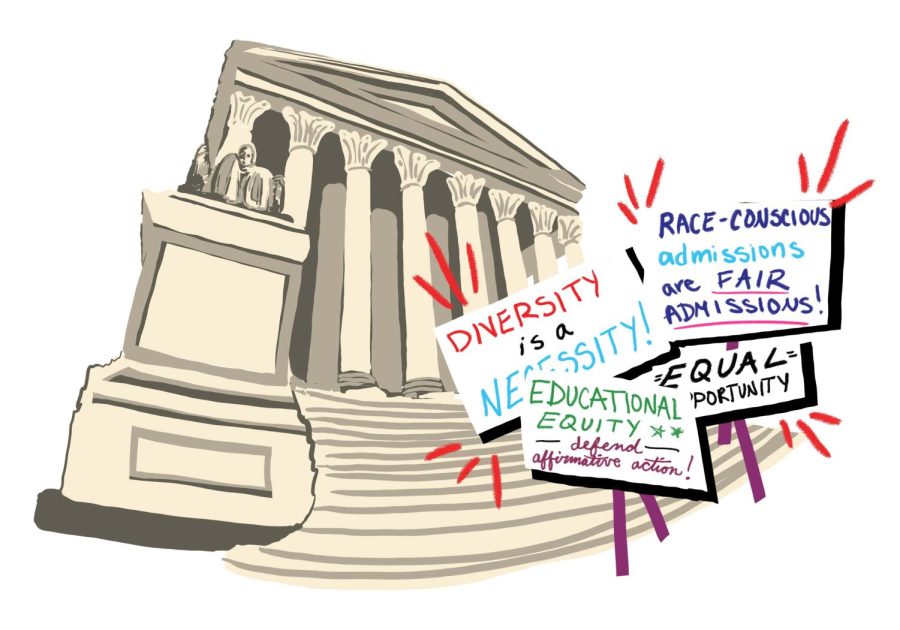Should race play a role in college admissions, or should merit alone determine who is accepted into a university? This is the longstanding question surrounding the controversy of Affirmative Action.
Affirmative Action is a set of procedures in college admissions intended to favor disadvantaged minorities on college campuses.
San Diego State University, along with many other universities in the United States have disregarded Affirmative Action from its institutions, creating other programs to ensure equal opportunity.
Now, the Supreme Court is questioning its value and necessity for higher education for all universities in the U.S.
In November 2022, there were two national cases surrounding Affirmative Action: Students for Fair Admissions v. Harvard, and Students for Fair Admissions v. The University of North Carolina heard by the Supreme Court. These universities are fighting to keep Affirmative Action while Students for Fair Admissions are attempting to take it away.
The court decision is expected to be determined in spring 2023, according to the New York Times.
Although SDSU does not use Affirmative Action, Ronald Evans, professor of Education, said he is “still troubled by the direction of the court.”
“There is a great deal of inequality in society, and Affirmative Action is a good faith attempt to do something about that,” Evans said. “I am generally supportive. On the other hand, it gets difficult when there is a quota that has to be met.”
Affirmative action is regarded as controversial by some people despite its stated objective to provide academic priority to disadvantaged students. While it was implemented in 1964 by President Lyndon B. Johnson to provide an equal opportunity for minorities, it potentially resulted in discrimination for other groups.
According to academic author Terry H. Anderson, it has led to “not clarity, but confusion,” he wrote in his book, “The Pursuit of Fairness: A History of Affirmative Action.”
“Supporters declare themselves the champions of racial justice, protectors of Martin Luther King’s Dream, while opponents see themselves as defenders of merit, of colorblind equal protection enshrined in the U.S constitution,” Anderson said.
Despite controversy with schools like Harvard and The University of North Carolina, California has a clear stance on it. CSU schools including SDSU do not use Affirmative Action at all.
Hazel J. Kelly, CSU manager of Public Affairs, commented on this matter in regard to CSU admissions.
She said that California banned Affirmative Action in public education admissions in 1996 with Proposition 209, and then again rejected it with Proposition 16 in 2020.
“If the Supreme Court decides to end Affirmative Action nationally, it won’t impact CSU admissions,” Kelly said.
Although CSU institutions do not consider Affirmative Action for admitting students, Kelly said the campuses are incorporating ways to support disadvantaged students.
“The CSU was supportive of the legislation in 2020 that brought Proposition 16 to state voters reinstating race-conscious admissions,” Kelly said. “This allows the CSU to target resources and support structures for underrepresented students to overcome opportunity barriers and help us close the educational equity gap.”
Affirmative Action has not prohibited diversity on campus at SDSU. According to the Division of Public Affairs , SDSU is a hispanic-serving institution with 33.2% of students being from a hispanic background in fall 2022.
“I think Affirmative Action is unnecessary because it continues the cycle of saying that a certain minority or race will always need supplemental help or assistance,” said Erica Savchenko, a junior kinesiology major.
Gabriel Scodeller, a political science major, also disagrees with Affirmative Action.
“A lot of things in America are well-intended,” Scodeller said. “But in actuality, they don’t work. There should be measures taken to diversify, but trying to satisfy quotas takes away from true merit.”









